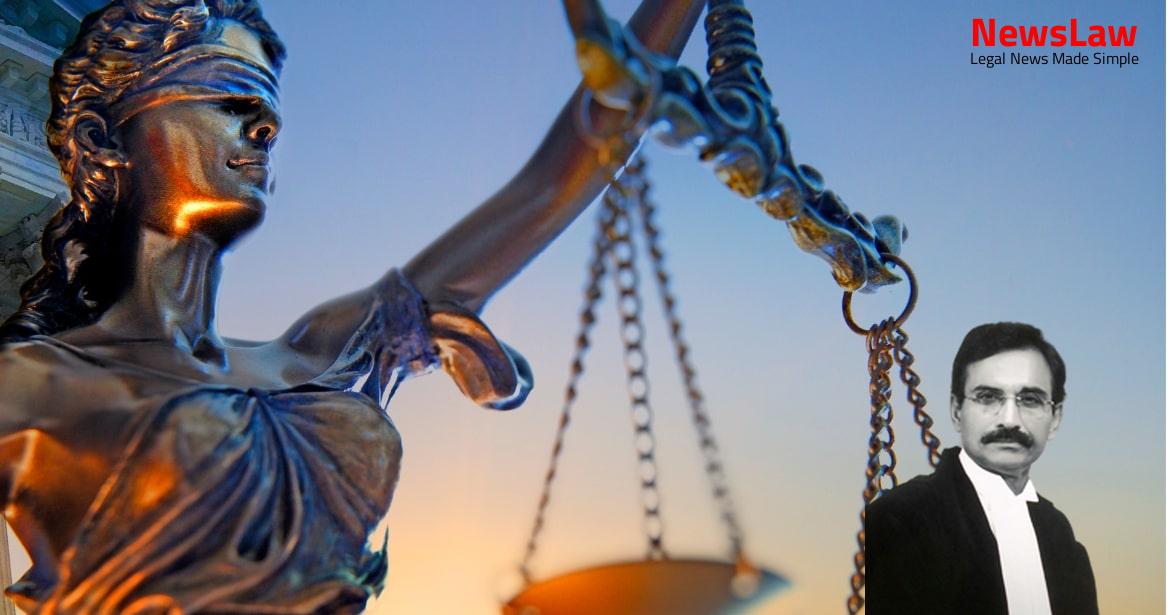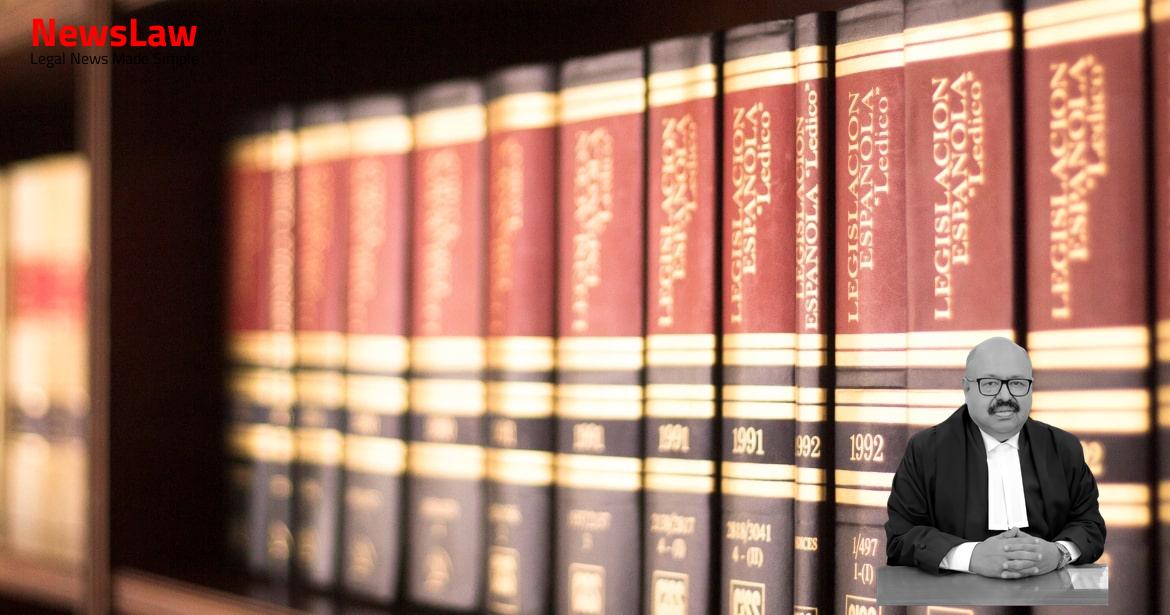In a significant ruling, the Supreme Court of India has overturned the decision of the High Court related to the regularization of services. The case involved a dispute regarding the regularization of services of employees in the Ambedkar Nagar Judgeship. Stay tuned to learn more about the implications of this judgement.
Facts
- The District Judge passed an order on 16.08.2014 declaring the regularization of the appellants as non-est.
- The District Judge withdrew the benefits granted to the appellants in an earlier order on the same day.
- Circular dated 05.11.2009 directed all District Judges to cease the work of daily wage appointees appointed after 31.12.2001 without following the law.
- Committee recommended the regularization of the appellants after considering the Circular and the cut-off date of 31.12.2001.
- District Judge regularized the services of appellants on 09.11.2012 based on the Committee’s report.
- Successor in office of District Judge annulled the regularization of the appellants on 16.08.2014 and ordered recovery of emoluments received.
- Appellants challenged the High Court’s dismissal of their appeals which were confirmed with modifications on 09.07.2018 by the Division Bench.
- The Committee report was primarily based on the Circular issued by the Registrar General of the High Court dated 05.11.2009.
- Division Bench directed consideration of one appellant’s case for regularization based on Uttar Pradesh Regularization Rules, 1979 as amended in 2001.
- Employees approached the Court for regularisation after being appointed on ad-hoc basis in the Ambedkar Nagar Judgeship.
- Several writ petitions were filed before the High Court after an advertisement for direct recruitment of Class-III employees in 2001.
- An order passed on 01.08.2006 allowed the appellants to apply in response to the advertisement and continue in service till the selection process was completed.
- The selection process was later cancelled, and appellants were continued in employment on an ad-hoc basis.
- Writ petitions were filed when the appellants’ services were terminated after dismissal by the High Court.
- A Committee recommended the regularization of the appellants after submitting its report on 12.07.2012.
- It was suggested that the District Judge send their names to the High Court for considering relaxation in age.
Issue
- The appellants were required to be appointed on a regular basis as a one-time measure as per the ruling in Umadevi case.
- The appellants had completed 10 years of service and were given temporary status with retrospective effect from 02.10.2002.
- The Court directed the regularization of the services of the appellants from 02.10.2002.
Also Read: CRPF Act: Validity of Rule 27 for Compulsory Retirement – Case of Head Constable vs. CRPF
Arguments
- The High Court failed to consider the rules framed during the pendency of the writ petitions.
- Rule 6 of the Rules framed in 2016 set the cut-off date as 31.12.2001.
- The High Court cancelled the order of regularization granted in 2012, directing that the appellants could participate in future recruitment processes for Class III posts with possible age relaxation and preference benefits.
- The appellants, aggrieved by the High Court’s decision, have approached the Court.
- The Committee under the Additional District Judge had recommended regularization based on a circular from the High Court in 2009.
- Referring to previous judgments, the counsel argues that the regularization order issued in 2012 was justified.
- The successor in the office of the District Judge had issued the regularization order in 2012 after considering the report.
- The counsel asserts that the facts did not warrant the successor to cancel the regularization order.
- Respondent’s counsel argues that the appeals should be allowed and the impugned order be quashed.
- The appellants were allowed to continue in service due to an interim order passed by the High Court.
- The benefit of one-time regularization, as per the Umadevi case, cannot be granted to the appellants.
- The Committee’s report dated 12.07.2012 was deemed collusive, leading to the cancellation of regularization orders dated 09.11.2012.
- The appellants are not eligible for equitable relief, and hence, the appeals should be dismissed.
Also Read: DAMEPL vs. DMRC: Curative Petition and Arbitral Award Restoration
Analysis
- Committee under the chairmanship of the Additional District Judge submitted a report on 12.07.2012.
- The District Judge passed an order of regularization on 09.11.2012 from 01.06.2012.
- The circular issued by the Registrar General of the High Court on 05.11.2009 was relevant to the appellants’ cases.
- Exception carved out in the case of Umadevi (supra) was considered in the appellants’ cases.
- Rules on regularization were amended during the pendency of the petitions with a cut-off date of 31.12.2001.
- All appellants were appointed before 31.12.2001.
- Change in the law with the cut-off date should have been considered by the High Court.
- Appellants were in service from 01.08.2006 due to interim orders.
- Selection process they participated in was later canceled in 2008.
- Appellants had served for almost 12 years when considered for regularization by the Committee.
- Successor in the office of the District Judge could not annul the regularization order done after proper procedure.
- The District Judge’s orders of 16.08.2014 were found to violate the principles of natural justice.
- A one-time regularization exception was noted for employees with 13 years of service or more.
- Parity with similarly situated employees benefited in the Sheo Narain Nagar case was acknowledged.
- The Rules amended in 2016 set a cut-off date of 31.12.2001 for regularization.
- Based on the above factors, the appellants are entitled to the regularization of their services.
Decision
- The appeals are allowed.
- The Judgement and order dated 14.09.2017 passed by the Single Judge of the High Court of Allahabad in Writ Petition No.4813(S/S) of 2014 and Writ Petition No.5530(S/S) of 2014 as well as Division Bench of the said High Court dated 09.07.2018 in Special Appeal No.440 of 2017 and in Special Appeal No.444 of 2017 are quashed and set aside.
- The orders dated 16.08.2014 passed by the District Judge, Ambedkar Nagar are quashed and set aside along with the consequential order of termination dated 23.9.2017.
- The order dated 9.11.2012 passed by the District Judge, Ambedkar Nagar regularizing the services of the appellants with effect from 01.06.2012 is upheld.
- Consequently, the termination of the appellants from their services is quashed and set aside, and the appellants are directed to be reinstated forthwith with continuity in service for all purposes including terminal benefits.
- The appellants would not be entitled to back wages for the period during which they are out of employment.
- In the facts and circumstances of the case, there shall be no order as to cost.
- All pending applications shall stand disposed of.
Case Title: RAJNISH KUMAR MISHRA Vs. THE STATE OF UTTAR PRADESH THROUGH PRINCIPAL SECRETARY DEPARTMENT OF LAW
Case Number: C.A. No.-009413-009414 / 2019



